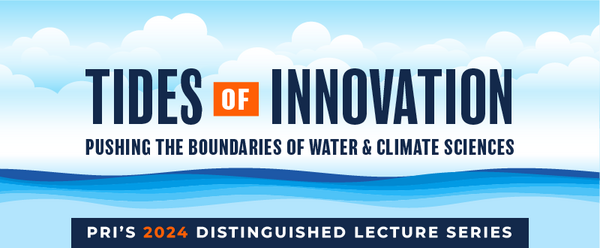
ISWS Seminar | Frontiers of Ecosystems and Environment Observations: Taking advantage of the sensor revolution | Scott W. Tyler
- Event Type
- Seminar/Symposium
- Sponsor
- Prairie Research Institute's 2024 Distinguished Lecture Series
- Location
- Illinois Room at the Illinois State Water Survey, 2204 Griffith Dr., Champaign, IL 61820-7463
- Virtual
- Join online
- Date
- Feb 14, 2024 3:00 - 4:30 pm
- Speaker
- Scott W. Tyler
- Views
- 54
Monitoring of the Earth’s climate, water, soil and ecosystems has gone through several transformative periods since the middle of the last century. Beginning with shipborne geophysical observations of continental drift in the 1950s, continuing with the launch of Landsat 1 in 1972, the development of precision GPS in the early 1990s, and culminating in the digital revolution of this century (both technological and computational), our ability to measure and predict the “pulse” of the earth’s surface and boundary layers with incredible temporal and spatial accuracy.
In this talk, we will present a sampling of new tools and technologies for sensing environmental processes at the next level of spatial (and temporal) scales. As we have seen from recent history, each time we observe at finer scales of measurement, our fundamental understanding of earth and ecosystem processes takes a quantum leap. The development of low-cost small Uncrewed Aircraft Systems (sUAS) now allows us to monitor soil, water, and the earth’s boundary layer at the centimeter scale, while autonomous ocean gliders provide us with ocean dynamics at depths across many of the world’s oceans. Distributed fiber optic sensing has long been used for ecosystem thermal mapping, yet now advances in acoustic and seismic sensing on fibers has the potential to turn the nation’s entire communication network into an environmental sensing network. And finally, thanks to the iPhones of the world and low cost micro-electro-mechanical or MEMs devices, new opportunities for very low-cost environmental sensors that can easily communicate are now possible. These advances as well as a brief discussion of their inputs to machine learning tools will be discussed with examples in the field.
Scott W. Tyler is a Foundation Professor (Emeritus) in the Department of Geological Sciences and Engineering at the University of Nevada, Reno. He holds degrees in Mechanical Engineering from the University of Connecticut and Hydrogeology from the New Mexico Institute of Mining and Technology and the University of Nevada Reno. He is the co-founder of the National Science Foundation‑supported Centers for Transformative Environmental Monitoring Programs (CTEMPs) Community User Facility focusing on the development and application of fiber-optic-based sensing of environmental temperature and strain. His research spans the atmospheric boundary layer, through the vadose zone and into the deep groundwater.
With mechanical engineering and hydrogeology training, he has extensive experience in the fate and transport of high and low-level commercial and defense-related radioactive waste in the subsurface, in both fractured rock and soils. He has also studied deep groundwater circulation beneath saline lakes, pore-scale modeling of root/soil interactions, evaporation and transpiration in hyper-arid regions of the world, and convection processes in groundwater systems. His recent work focuses on the measurement of the dynamics and thermal evolution of Antarctic ice shelves and the ocean waters below. As part of the NSF‑supported International Thwaites Glacier Collaboration project, he has designed and developed fiber-optic moorings on the Thwaites Glacier to monitor temperature in both the floating ice shelf and the underlying ocean which has been operating at Thwaites since 2020.
Tyler has published ~130 peer-reviewed journal articles and book chapters in the fields of hydrology and hydrogeology. He is a fellow of the American Geophysical Union, the Geological Society of America, and the Soil Science Society of America. He currently serves on the U.S. Nuclear Waste Technical Review Board. He is a member of the University of Connecticut’s Academy of Distinguished Engineers. He has served as chair of the Hydrogeology Division of the Geologic Society of America and President of the Hydrology Section of the American Geophysical Union.